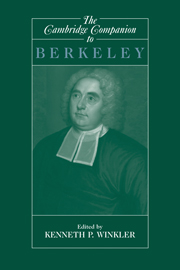Book contents
- Frontmatter
- Introduction
- 1 Berkeley’s life and works
- 2 Was Berkeley an empiricist or a rationalist?
- 3 Berkeley’s notebooks
- 4 Berkeley’s theory of vision and its reception
- 5 Berkeley and the doctrine of signs
- 6 Berkeley’s argument for immaterialism
- 7 Berkeley on minds and agency
- 8 Berkeley’s natural philosophy and philosophy of science
- 9 Berkeley’s philosophy of mathematics
- 10 Berkeley’s moral and political philosophy
- 11 Berkeley’s economic writings
- 12 Berkeley on religion
- Appendix
- Bibliography
- Index
12 - Berkeley on religion
Published online by Cambridge University Press: 28 August 2006
- Frontmatter
- Introduction
- 1 Berkeley’s life and works
- 2 Was Berkeley an empiricist or a rationalist?
- 3 Berkeley’s notebooks
- 4 Berkeley’s theory of vision and its reception
- 5 Berkeley and the doctrine of signs
- 6 Berkeley’s argument for immaterialism
- 7 Berkeley on minds and agency
- 8 Berkeley’s natural philosophy and philosophy of science
- 9 Berkeley’s philosophy of mathematics
- 10 Berkeley’s moral and political philosophy
- 11 Berkeley’s economic writings
- 12 Berkeley on religion
- Appendix
- Bibliography
- Index
Summary
Berkeley was a religious philosopher throughout his working life, and much of his philosophical work has interesting implications for the proper understanding of that “watchful, active, intelligent, free Spirit, with whom we have to do, and in whom we live, and move and have our being” (TVV 2). There may still be critics who imagine that God only entered his philosophy to fill the gaps between one finite observer's perceptions and the next, or to save his episcopal reputation. The truth is that the works for which he is still chiefly known were written when he was a struggling research fellow at Trinity College, Dublin, but already deeply religious. “Strange impotence of man. Man without God. Wretcheder than a stone or tree, he having only the power to be miserable by his unperformed wills, these having no power at all” (N 107). He later rejected the aphorism, presumably because it might easily have given the wrong impression. He also rejected the wording of the commitment he made in his notebooks (or Philosophical Commentaries): “Actions leading to heaven are in my power if I will them, therefore I will will them” (N 160). Both remarks remained close to his conviction.
- Type
- Chapter
- Information
- The Cambridge Companion to Berkeley , pp. 369 - 404Publisher: Cambridge University PressPrint publication year: 2005
- 1
- Cited by



